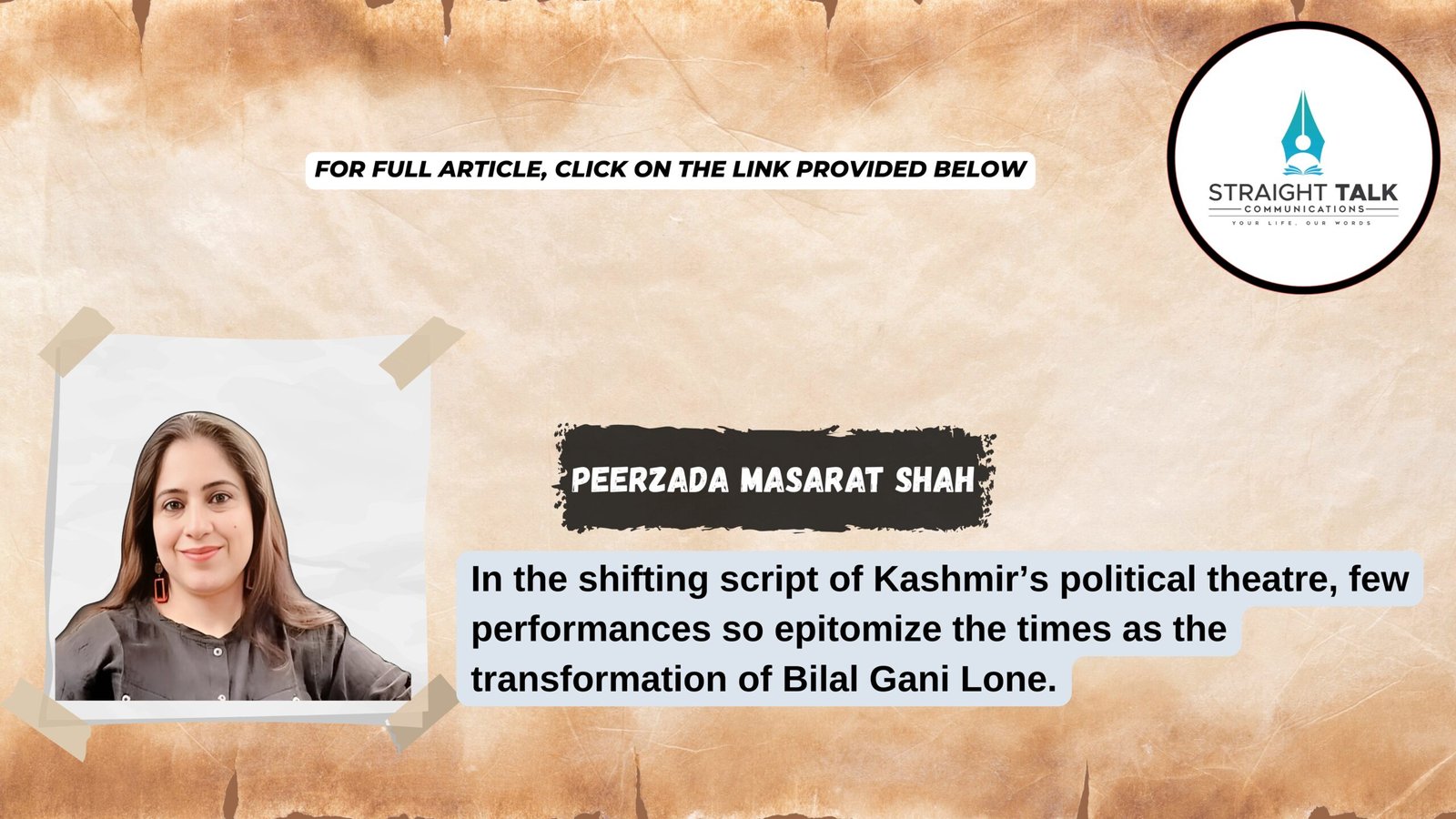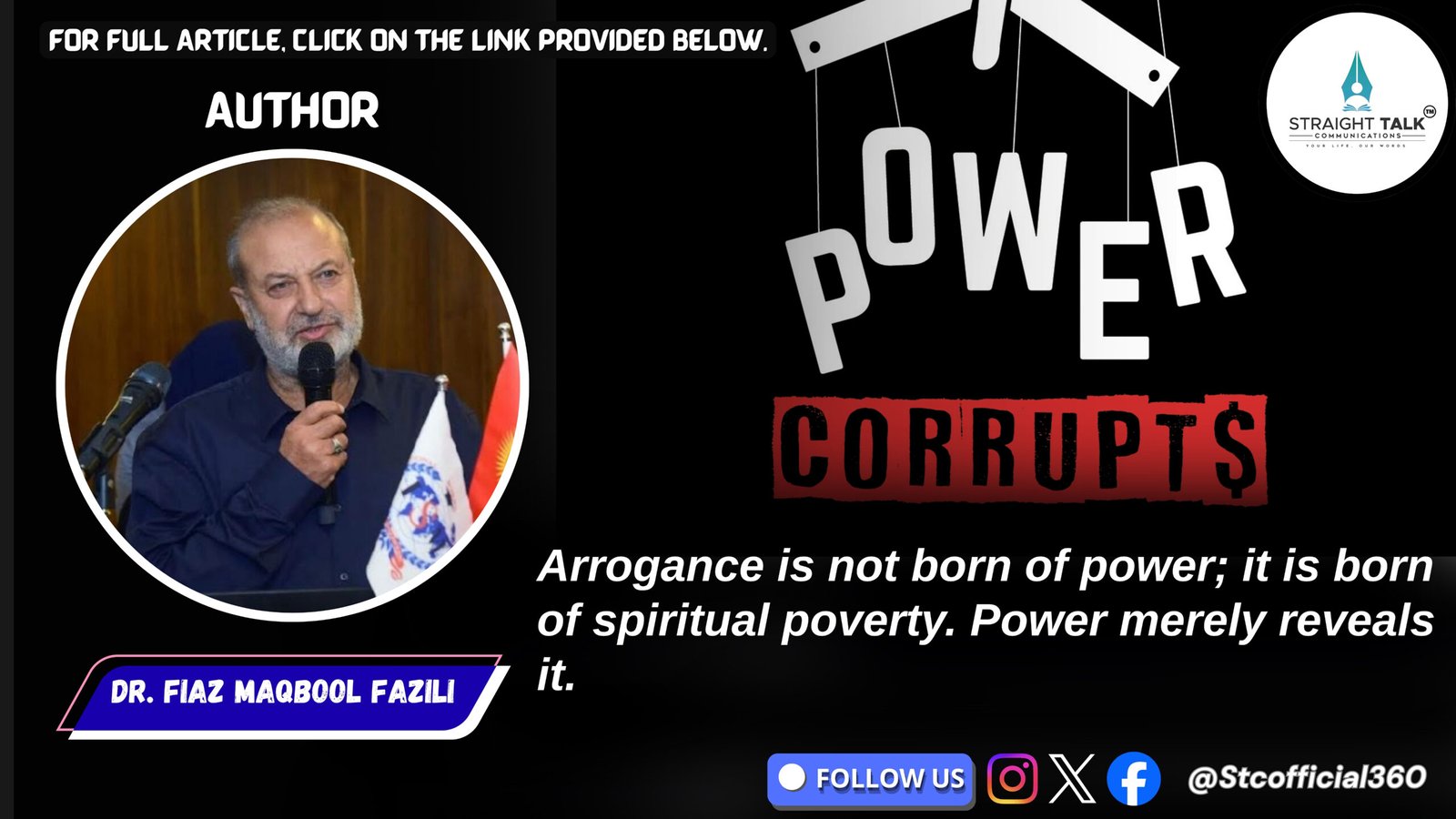From “Azadi” to Accommodation: The Remarkable Reinvention of Bilal Gani Lone and Kashmir’s ‘Post-Resistance’ Politics

Peerzada Masarat Shah
In the shifting script of Kashmir’s political theatre, few performances so epitomize the times as the transformation of Bilal Gani Lone. Once a frontline figure in the Hurriyat Conference, a coalition that galvanized generations with chants of “Azadi” (freedom), Lone has stepped away from separatism’s barricades to navigate the corridors of mainstream Indian politics. The son of Abdul Gani Lone — who himself was assassinated for advocating dialogue — Bilal’s journey mirrors both the exhaustion of the separatist movement and the adaptive instincts of its elite. If ever irony needed a portrait, it would look like Bilal Lone’s recent press conference, flanked not by protest placards, but by the rhetoric of “pragmatism” and “adjustment.”
Breaking with the Past: The Hurriyat’s Irrelevance
In a widely circulated 2024 interview, Lone declared the Hurriyat Conference “irrelevant” and “non-functional.” This revelation, while perhaps dramatic in context given his family’s history, echoes a reality that most Kashmiris have quietly acknowledged for years. Hurriyat — the once-feared alliance launched in 1993 as a political front for various separatist, Islamist, and pro-Pakistan factions — has visibly withered. Its top leaders, like Syed Ali Shah Geelani (who died in 2021 under house arrest), Mirwaiz Umar Farooq (mostly confined in his home since 2019), and Yasin Malik (serving life sentence under terror-financing charges), are either silenced, incarcerated, or marginalized.
Data underscores this decline: Hurriyat’s ability to mobilize mass protests, especially after the 2008 and 2010 uprisings, has plummeted. Post-August 5, 2019 — the day India abrogated Article 370 and bifurcated Jammu and Kashmir — the organization failed to even call a major hartal (shutdown), a tool it wielded with ease for two decades. The government’s crackdown on its finances and cadre, including the 2023 ban on Jamaat-e-Islami and arrests under the UAPA (Unlawful Activities Prevention Act), further crippled its operations. The Hurriyat today is a shadow of its former self — bereft of both moral authority and street power.
Lone’s admission is, therefore, less news and more obituary. Yet, coming from the heir to a family synonymous with Kashmiri resistance, his words represent a watershed: a tacit acknowledgment that the idea of “plebiscite” or even “soft separatism” has no currency left in the new order.
Pakistan: From Patron to Pariah
Giving the devil its due, Bilal Lone’s candor about Pakistan’s “fissures” is refreshing. For decades, Islamabad positioned itself as the guardian of Kashmiri aspirations. Declassified documents (see US State Department cables from the 1990s) and multiple investigations have revealed the extent of ISI’s funding to groups like JKLF, Hizbul Mujahideen, and Hurriyat. But after 2016 — when Pakistan found itself in the Financial Action Task Force (FATF) grey list and bogged down by its domestic crises — the support ebbed.
Lone is not alone in recognizing this. Abdul Rashid, a 25-year-old protestor injured in the 2010 Intifada, laments, “All those slogans about Pakistan, and where are they now? Even their cricket team barely visits.” Reports by the South Asia Terrorism Portal and the 2023 MHA annual report confirm a dramatic fall in cross-border infiltration — from an average of 130 incidents per year in 2017–18 to under 50 in 2023. Both the financial pipeline and political narrative from Rawalpindi dried up, leaving erstwhile allies to fend for themselves.
Lone’s frankness — “We could have got something for our people, but we couldn’t” — is perverse closure for the generation who invested hope in talks, only to watch them turn to dust. But critics are quick to note: this ‘awakening’ comes suspiciously after all paths to power through separatism or Pakistan have been barricaded.
Pragmatism or Political Opportunism?
Lone now claims his “only motivation” is the younger generation, urging Kashmiris to work within the Indian mainstream. It’s not a unique sales pitch. Since 2020, leaders like Sajjad Lone (his brother, now an active participant in J&K mainstream elections), Altaf Bukhari (founder of Apni Party), and even peers like Ishfaq Jabbar (ex-NC MLA) have adopted the lexicon of development and political accommodation. In the 2024 Lok Sabha elections, nearly 54 percent voter turnout in Baramulla — traditionally a separatist bastion — suggests a readiness to try new methods, if only for economic security.
Lone’s statement that he isn’t interested in becoming MLA or CM “for now,” however, is met with widespread cynicism. In a region where politicians have routinely switched slogans as easily as allegiances — think of PDP’s Mehbooba Mufti, once an ally of BJP; or ex-separatists like Javed Mir and Firdous Shah, now navigating ‘mainstream’ — such disclaimers are rightly scrutinized. Power frequently dons the mask of restraint here.
The New ‘Normal’: Security and Surrender
The most jarring part of Lone’s transformation is his praise for the “first-class” security situation and the “stick” policy now deployed by security agencies. NCRB data attests to this: civilian fatalities in terrorist-related violence dropped from 37 in 2018 to under 10 in 2023. Shops stay open. Militancy-related incidents are down by nearly 70 percent, say police records. The much-maligned bunkers and paramilitary presence remain, but encounters and hartals are rare.
Lone’s defense of the stick — calling it a “staff of stability” — rings hollow given decades of Hurriyat’s denunciations of “militarization” and “oppression.” This shift is not just his own. After abrogation, even the PDP’s once firebrand leaders called for “stability and peace,” a line resonant with New Delhi’s mantra.
From Resistance to Consultant: A Broader Trend
Lone’s transformation is not isolated. Most senior leaders of the 1990s separatist era are now either seeking relevance through engagement or have faded completely. Shabir Shah, once described as the “Nelson Mandela of Kashmir,” is now imprisoned and out of the headlines. Masarat Alam, who replaced Geelani as Hurriyat chairperson, is incarcerated. Even the young firebrands of the 2010 uprising — like Asiya Andrabi or Qasim Faktoo — are removed from the scene.
Many others, like the Mirwaiz, who was finally allowed to deliver a khutba (sermon) at Srinagar’s historic Jama Masjid after four years of house arrest, called for “peaceful coexistence.” The rhetoric is clear: if you can’t beat the system, become its consultant or, at the very least, avoid its wrath.
Public Trust: The Ultimate Casualty
The shift from “freedom” to “cooperation” comes at a cost. Parents who lost sons in 2016, or wives whose husbands disappeared during the 1990s ‘crackdowns,’ are left disillusioned by the about-face of those claiming to represent them. According to a 2023 survey by the Centre for the Study of Developing Societies (CSDS), trust in political leaders — both separatist and mainstream — remains abysmally low; only 22 percent of Kashmiri respondents said they believed politicians were “acting in the people’s interest.” Sakeena Bano, mother of a 2018 encounter victim, says bitterly, “They told us to send our children out with stones, now they tell us to learn coding.”
Redemption or Rebranding?
As Lone reinvents himself — perhaps as “moderate,” perhaps as “independent,” perhaps quietly aligned with power — the lessons should not be lost. The story of so many Kashmiri leaders is not one of redemption, but repackaging. The slogans may change, but the system rewards those who adapt, not those who dissent.
For Kashmiri society, exhausted by decades of conflict and betrayal, the future lies not in the charisma of political chameleons but in sustained vigilance. As the masks change and new narratives emerge for the evening news, one truth remains: a politics built on convenient conversions — however attractively branded — cannot erase the memory of broken promises.
If resistance is dead, it is not buried — it is merely being repurposed, waiting for a new chapter or a new generation to give it expression. The story of Bilal Gani Lone is neither an ending nor an epiphany; it is, like much of Kashmir’s modern history, an unfinished script.
(The views are of the author and not of Straight Talk Communications)








The last paragraph has a lot of import. It forewarns “Lull before the impending storm”